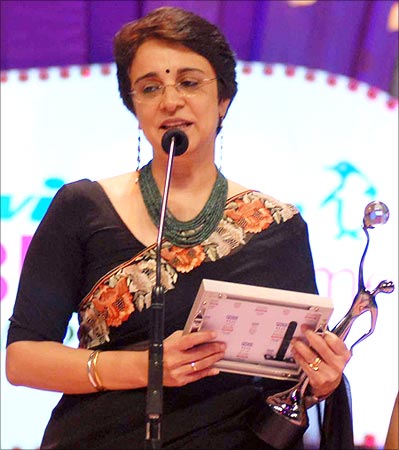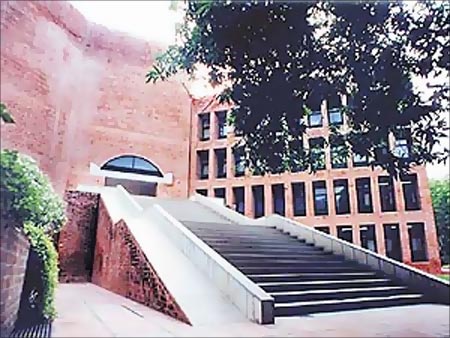Photographs: GR8!TV Magazine Prasanna D Zore
Every time <B>Madhabi Puri Buch</B>, chief executive officer and managing director of ICICI Securities gets a new assignment this is what she tells herself and her teammates: Nothing is rocket science; we can learn this; we can do it. <P>
And she has adorned many an important posts in her 16-year-long career in ICICI Bank. Before her current assignment Madhabi was an executive director on the board of ICICI Bank. She has also been at the helm of the bank as head of global operations covering retail, corporate, rural and international banking and also the chief brand officer of ICICI Group. <P>
As part of our <B><A HREF="https://www.rediff.com/getahead/women09.html" target=new>Women's Day</A></B> coverage <B>Prasanna D Zore</B> spoke to Madhabi Puri-Buch on her career growth in ICICI Bank, the influences in her life, the lessons she learnt and her advice to young Indians who fear job layoffs. <P>
Her advice to employees in a nutshell is: It is <I>now</I> more important than any other time to deliver. <P>
<B>Early influences in life</B><P>
I was very fortunate to have a set of parents who not only believed in education but very much believed in their two daughters being individuals in their own right and having an identity of their own. My father worked in the corporate sector and my mother was an academic who did her doctorate in political science. So education and career were very much the part of the environment and I think it makes a difference as you grow up seeing that and it becomes a part of you. <P>
I went to the Convent of Jesus and Mary in Delhi. A workshop conducted by Sister Mercedes helped us think through as to what we wanted in life. It just made me realise with even more conviction that I always wanted to be able to make a difference, leave an impact, no matter how small or how big. <P>
I had a strong, independent mind right from my school days; at least my teachers would say that. In Class XII I was a complete nerd, with big spectacles, a real bookworm; I must admit that I studied really hard. Outside of academics I very much enjoyed debating as it helped me form a point of view, express it and convince a hall full of people; it was really challenging and enjoyable. <P>
<B>You completed your graduation in mathematical economics. What motivated to choose this stream?</B> <P>
It was an honours course in mathematics with economics as a subsidiary subject. While I was really fond of mathematics, what was all the rage when I studied in St Stephen's College, Delhi, was economics. So everybody wanted to do economics and I too had the required marks to be called for an interview. <P>
But unfortunately just three days before the interview I was very seriously ill with jaundice -- of course I was busy eating all kinds of street food which I still haven't stopped because I believe you need to build your immunity -- and I was admitted to a hospital. The doctor didn't allow me to go for the economics interview and so I couldn't get admission. <P>
Fortunately, the mathematics interview was scheduled a few days later and despite not keeping too well -- the doctor advised me against it but still I went for an interview with drips sticking out of the hand. You can let one opportunity go; you can't let every opportunity go. <P>
My parents, on the other hand, were really very supportive as they understood that I really wanted to do it. <P>
While I loved mathematics too I would not hesitate to tell my teachers that I didn't understand a particular economic model, please explain it again because I was confident that if they will explain it again I would understand complex topics like quantitative modelling and algorithms.
'IIMs are a ruthless process; you either sink or swim'
Image: IIM AhmedabadPhotographs: Rediff Archives
H<B>ow did IIM-A happen? Was it as competitive in your time as it is today?</B>
<P>
While in Class XII I was debating if I wanted to become a doctor or do a management degree. I used to accompany my elder sister, who was doing physiotherapy, to hospitals which helped me understand that I was not suited to do medicine. Management and corporate world were perhaps better suited for me which is why I opted for doing an MBA. <P>
I think doing a management course from an IIM was as competitive as it is today. I don't know what the numbers were then but it was certainly very aspirational, very tough to get in. I applied to almost all the IIMs because my mind has always been like a conservative banker. You most certainly have a plan, but then you have a back-up plan and a back-up to a back-up plan. <P>
Fortunately again, IIM Ahmedabad happened and I met friends from whom I learnt a great deal. I really learnt here how to work under pressure and how to work in teams. Because on day one they throw you into the deep end of the pool without any life-saving support and you just have to learn to swim. There are no sympathies; it's a ruthless process; you either sink or swim, it's up to you. It really is high pressure. <P>
I think IIMs culturally attune you to multi-tasking; you just have to juggle five subjects at the same time, handle five different projects. A deadline meant a deadline; if you are late even by a minute they will not take your assignment.<P>
'Nothing is rocket science; we can learn this; we can do it'
Image: ICICI BankPhotographs: Rediff Archives
A<B>bout your journey in ICICI Bank...</B><P>
My entire stint in ICICI Bank can be divided into two parts. I worked there for four years then took a three year career break during which time I went to the UK with my husband and when I came back I joined ORG MARG, a market research firm and ICICI (<I>ICICI and ICICI Bank merged in 2001 to form ICICI Bank</I>) was a client of mine. One day when I was making a presentation to them for the project that I had done for them which went very well: ICICI was pleased, I was very happy. 15 minutes after I reached office that day I got a call from ICICI's Nachiket Mor telling me that I was on the wrong side of the table during the presentation. <P>
After thinking about it for a while I joined back ICICI in 1997. Over the next 12 years I handled over eight to nine different assignments. Fortunately, India was going through a very good economic phase then and I could use that opportunity to grow the business and simultaneously groom a successor. One major reason why I achieved what I did because of a great pool of talent that worked with me. I could groom a successor rapidly and I could then move over to the next job. <P>
Every time I get a new assignment I say this to myself and my teammates: Nothing is rocket science; we can learn this; we can do it. <P>
'You can always make a difference'
Image: Kalpana Bedi and Walt DisneyPhotographs: Rediff Archives
Y<B>our inspirations in life...</B><P>
My inspirations in life are actually two people, quite different from each other. One is Walt Disney and other is Kiran Bedi. <P>
Here was a man who with his sheer ideation and thoughts created a whole new world which would not have existed had he not existed. When you see tens of thousands of people in Disney World, and see how much joy that place gives them because of the brainchild of one human being you understand the spirit and hard work behind that effort. <P>
I admire Kiran Bedi for a different set of reasons. She was given all kinds of assignments, many of them considered as punishment postings but yet she added her own stamp and value to them. When she went to Tihar Jail she created so much value and brought such a dramatic improvement to the lives of prisoners there; when she was made in charge of traffic in Delhi she created huge value there as well. <P>
The lesson that these two different individuals taught me was, it doesn't matter if what you are doing is supposedly glamorous or exciting, you can always make a difference and that is a source of inspiration. <P>
<B>Success mantras...</B> <P>
I have a very simple formula and I think that formula really works well everywhere: You just have to deliver. The organisation which you work for has an objective and you have to understand what that purpose is and what your organisation expects from you. And then you just have to go out there and deliver. <P>
It's an unfailing formula. You deliver in one job and people who matter will notice it and praise you for it. And the next opportunity just arises. People are willing to take chance with you; they are willing to risk important assignments to you.
'It is more important to deliver now than any other time'
Image: Jet Airways employees after their layoff last yearPhotographs: Punit Paranjpe/Reuters
A<B>dvice to employees who fear job layoffs...</B><P>
This is not the last economic down cycle that we will see. My advice for the future is you have to build equity and invest in an institution. If you are a rolling stone, flitting from one organisation to another just because somebody is giving you a 20 per cent hike then you are not investing in an organisation. And then when the next downturn comes you may turn out to be the first person to go because you have not invested. <P>
The solution lies in planning your career for the long term. <P>
But then this doesn't help those youngsters who are in this situation today. The only advice I would proffer is now more than any other time it is important to deliver. You need to show more than 100 per cent commitment to your company. This is the time to be knuckling down and proving that you are one of the strongest hands on the ship's deck and help steer your company in this time of rough weather. And if you do that, it indeed gets recognised. <P>






Comment
article